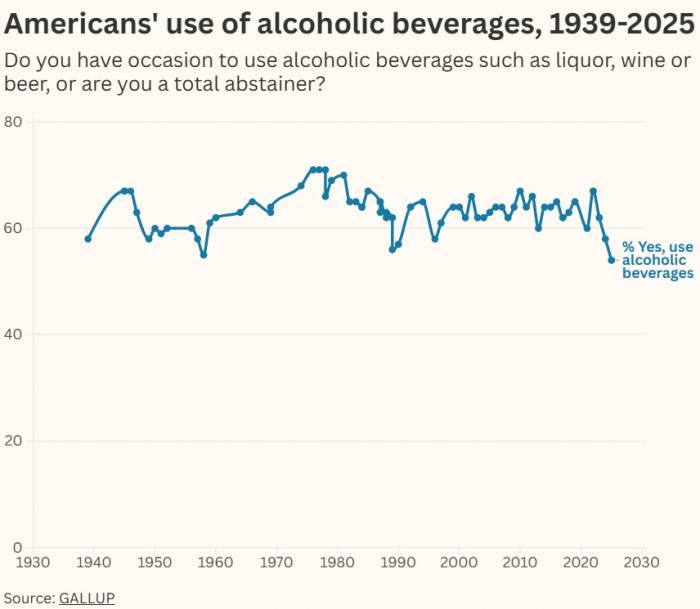U.S. Alcohol Use Falls to 54 Percent, Lowest Rate Since 1939, Gallup Finds
Sober-curious movement, health warnings, and nonalcoholic alternatives drive historic decline in American drinking habits
2025-10-15

Alcohol consumption in the United States has dropped to its lowest level since 1939, according to a recent Gallup poll. Only 54 percent of U.S. adults now say they drink alcohol, a significant decline from 67 percent in 2022. The survey also found that just 24 percent of respondents reported having an alcoholic beverage in the last 24 hours, another record low.
Experts at Harvard Medical School and affiliated hospitals point to several factors behind this shift. The so-called “sober-curious” movement has gained momentum, especially after the COVID-19 pandemic. Social media campaigns and popular challenges like “Dry January” and “Sober October” have encouraged Americans to reconsider their relationship with alcohol. Marisa Silveri, associate professor of psychiatry at Harvard Medical School and director of McLean Hospital’s Neurodevelopmental Laboratory on Addictions and Mental Health, said that decades of neuroscience and public health research are finally making an impact on real-world behavior.
During the pandemic, alcohol consumption spiked, raising concerns among public health officials about long-term health consequences such as cancer and liver disease. However, the trend has since reversed. Silveri credits increased awareness and education for this change. She also notes that wearable technology, such as fitness trackers, has played a role by providing users with immediate feedback on how alcohol affects their sleep, heart rate, and overall well-being.
Recent scientific studies have challenged the idea that moderate drinking is harmless or beneficial. The U.S. surgeon general warned earlier this year that alcohol is the nation’s third-leading preventable cause of cancer, after smoking and obesity. Even one drink per day can increase the risk for certain cancers, including breast, mouth, and throat cancer.
Silveri emphasized that any reduction in alcohol use can lead to measurable improvements in sleep, mood, and cognitive function. For some people with alcohol use disorder, abstinence is necessary, but even modest reductions can yield benefits.
Joji Suzuki, associate professor of psychiatry at Harvard Medical School and director of Brigham and Women’s Hospital’s Division of Addiction Psychiatry, highlighted the growing availability of non-alcoholic alternatives like mocktails and nonalcoholic beer and wine. These options have helped reduce stigma around sobriety and made social settings more inclusive for non-drinkers.
Suzuki also pointed to new medications as a factor in declining alcohol use. Drugs known as GLP-1 inhibitors—originally developed for diabetes and weight loss—have been found to reduce cravings for both food and alcohol. Clinical trials are being considered to test these medications specifically for treating alcohol use disorder.
Generational changes are also evident in the data. Gyongyi Szabo, professor of medicine at Harvard Medical School and chief academic officer at Beth Israel Deaconess Medical Center, noted that young adult drinking rates have been falling for a decade. The Gallup poll showed a drop from 59 percent in 2023 to 50 percent today among young adults. Szabo attributes this shift to greater awareness among younger generations about the health risks associated with drinking.
The pandemic may have had unexpected effects on youth drinking habits as well. With schools closed and social gatherings limited, many teenagers delayed their first experiences with alcohol. Research shows that postponing the onset of drinking reduces the risk of developing addiction later in life.
Despite these positive trends, experts caution that problem drinking remains a serious issue. Jagpreet Chhatwal, associate professor of radiology at Harvard Medical School and director of Massachusetts General Hospital’s Institute for Technology Assessment, said that while overall consumption is down, binge drinking and high-risk drinking were not addressed in the recent survey. He warned that it will take years before any reduction in heavy drinking translates into lower rates of liver disease.
Suzuki added that women are closing the gap with men when it comes to problem drinking, leading to an increase in alcoholic liver disease among women. Emergency rooms continue to see high numbers of patients with alcohol-related issues.
While there are still areas of concern, health experts agree that the growing interest in sobriety and moderation is a positive development for public health in the United States.
Founded in 2007, Vinetur® is a registered trademark of VGSC S.L. with a long history in the wine industry.
VGSC, S.L. with VAT number B70255591 is a spanish company legally registered in the Commercial Register of the city of Santiago de Compostela, with registration number: Bulletin 181, Reference 356049 in Volume 13, Page 107, Section 6, Sheet 45028, Entry 2.
Email: [email protected]
Headquarters and offices located in Vilagarcia de Arousa, Spain.